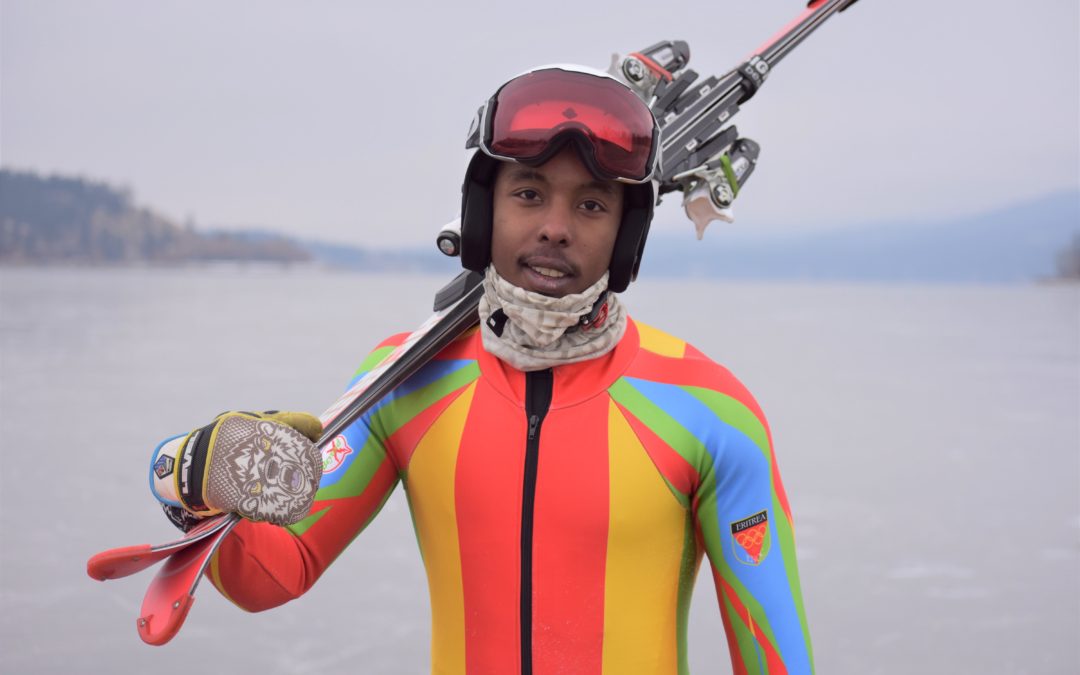This month’s professional spotlight is Shannon-Ogbnai Abeda an Eritrean-Canadian alpine skier who made us all proud when he competed for Eritrea in the 2018 Winter Olympics. Read Shannon’s spotlight to learn about his remarkable journey!
How did you come to decide that skiing was the right athletic path for you?
As a young kid, my parents enrolled me in several extra-curricular activities (e.g. swimming, karate, soccer, etc.) along with skiing. I was never very fond of skiing and wanted to be a hockey player most of my life – until I moved to Calgary, Alberta, Canada. Calgary exposed me to a more challenging and difficult training environment. When I was 9-10 years old, I had a coach who pushed me out of my comfort zone and was very critical of my performance. When I started seeing results and my ability improved, I figured that this would be the best path for me and I decided to dedicate myself to wherever this path would take me.
Could you describe what an average day looks like for you?
My day is dependent on the season and where I am currently residing. During the summer/fall, I’m training every day, up to two times a day, and working 15-30 hr per week on a shift schedule. The past two years, I’ve been taking three classes per semester to maintain my full-time student status and continue my studies in Computer Science. Towards the end of 2016, I’ve put a lot of emphasis on my education to have a backup plan since my injury.
During the winter, my priority is shifted to training and school. I’m usually up around 5:30-6 am to prepare for my training session and a long day. I’m on snow 5-6 times a week and up to twice a day. Our first session begins at 9 am and typically ends before noon. Our weekly training block is all dependent on the stage of our periodization plan before a competition, and we have another session in the afternoon to focus on another discipline. I could be off the hill anywhere from 12:30-4 pm on a given day.
After training, I’m in the gym doing recovery and conditioning work. I cycle through doing maintenance work every other day and heavy volume on my rest days. My day usually ends around 7-8 pm. If I have time after eating and prepping for the next day, I try to do an hour of school work or review a video from training. Before bed, I’ll read a few pages of a book, catch up on emails or have a quick FaceTime with my parents. My lights are out between 9:30-11:30.
This next year I’ve decided to take a year off and prioritize finishing two years of my degree before the next Olympic cycle. I’m currently on a work/travelling term for the fall semester, so I have been working 40+ hours and training twice a day. My work schedule is shift schedule so can vary week by week.
What was it like competing in the Winter Olympics and representing Eritrea?
I’m still trying to let everything that has happened this past year sink in and put into words. I’m still in somewhat disbelief that I was in Korea and at the Olympics – it feels like it was only a few days ago. Being in that atmosphere was surely nerve-racking and a learning experience – it was humbling to compete against some of the best athletes in the world.
Being able to represent Eritrea at the Olympics was an honor and privilege. My goal was to raise awareness of the accessibility of winter sports to the diaspora and encourage the youth to get involved. I never expected the response and encouragement I received from the Eritrean community, and I am looking forward to what the future holds for our Winter Federation.
Is there a philosophy that drives your career?
What you put in, will be what you get. I never knew what this meant, but growing up I was lazy and didn’t want to put in the extra work to receive the results. The outcome was expected – failure or disappointment. So learning from my past, I try to take that lesson forward and put every extra bit into training, school or any life goals that I am pursuing because, in the end, it will make all the difference.
One of my coaches once said that you will only be as strong as your weakest link. One aspect of your life/career might be flourishing, and another might be in complete disarray. If you choose to ignore your weakness, they will catch up to you, and you will not progress. So I really like to put extra emphasis on my faults.
What do you consider to be your greatest accomplishment as an athlete?
To this day, my greatest accomplishment was somehow being able to survive the 6-year journey to the Olympics and succeed. I am very proud of all the training, work and hardships that I overcame on my own terms and achieved.
What advice would you give someone looking to be a professional athlete/Olympian someday?
Patience and perseverance! It’s very simple, but it’s much easier said than done. Don’t let small mishap derail you and pay attention to every small detail rather than the bigger picture. Focus on long-term results rather than short-term because they will be less rewarding and distracting. If you have a goal, plan, put in 110% effort and grind away. Success will come eventually.
Outside of all of your hard work and efforts toward building your brand, what do you do for fun? Hobbies?
I really enjoy reading, writing and watching movies in the theater or on streaming services. Even though my fitness training is a part of my regimen, I really enjoy getting a workout done.

